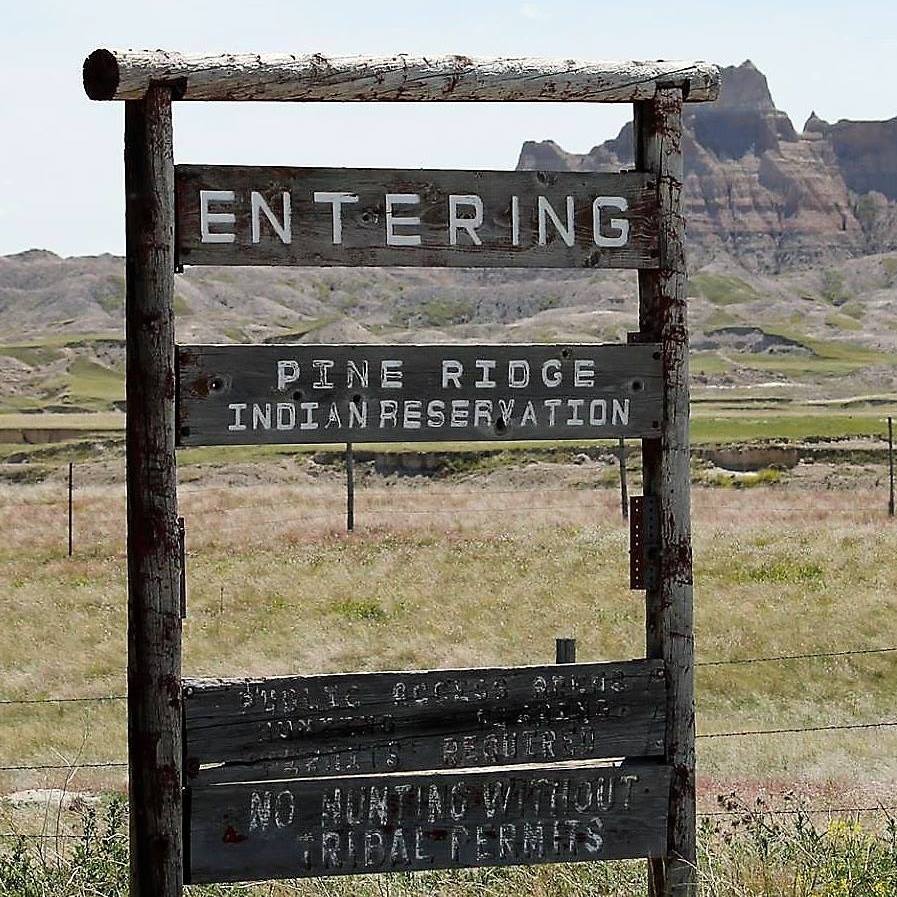
- Details
- By Levi Rickert
The Oglala Sioux Tribe has banned South Dakota Governor Kristi Noem (R) from the Pine Ridge Indian Reservation after the governor gave an incendiary speech about immigration to the South Dakota legislature last Wednesday.
In the speech, Noem stated she wants to send razor wire and security personnel to Texas to stop immigration to the U.S.-Mexico border. She also stated that a gang–allegedly tied to a cartel, calling themselves the Ghost Dancers are bringing drugs onto the reservation.
The banishment came Friday in a four-page statement written by Oglala Sioux Tribe President Frank Star Comes Out.
"Due to the safety of the Oyate [people or nation], effective immediately, you are hereby banished from the homelands of the Oglala Sioux Tribe!" Tribe President Frank Star Comes Out said in a statement addressed on Friday to Noem.
Star Comes Out accused the governor, an avid supporter of former President Donald Trump, of making the immigration problem a political issue to benefit the former president’s chances of reelection. Star Comes Out suggested Noem is vying to be Trump’s vice president nominee.
The Oglala Sioux president says Noem is wrong about the immigrants seeking asylum in the United States when she said they need to be put into cages. Star Comes Out said many of the immigrants are Indians from places like El Salvador, Guatemala, and Mexico who arrive at the southern border “in search of jobs and a better life.”
"They don't need to be put in cages, separated from their children like during the Trump Administration, or be cut up by razor wire furnished by, of all places, South Dakota," he said.
The Oglala leader expressed his resentment on Noem’s speech when she mentioned a gang calling themselves the Ghost Dancers is murdering people on the Pine Ridge Reservation and is affiliated with border-crossing cartels that use South Dakota reservations to spread drugs to other parts of the country.
“I and the Oyate are deeply offended that you alleged ‘Ghost Dancers’ are affiliated with these cartels. Ghost Dance: one of the most sacred ceremonies was used with blatant disrespect and is insulting to our Oyate,” Star Comes Out wrote in his conclusion.
Friday’s banishment was not the first time the Oglala Sioux Tribe told Noem she is not welcome on its reservation. The Noem administration has a history of maintaining a contentious relationship with the South Dakota tribes.
In May 2019, the Oglala Sioux Tribal Council unanimously voted to tell her she is unwelcome on the Pine Ridge Reservation until she rescinds her support for anti-protest legislation. Two additional Sioux tribes — Cheyenne River and Yankton — expressed their solidarity with the Oglala Sioux Tribe.
During the COVID-19 pandemic, Noem had a showdown with the Oglala Sioux Tribe and Cheyenne River Sioux Tribe when the two sovereign nations decided to close its reservations to non-Natives.
More Stories Like This
Navajo Resources and Development Committee Issues Notice on Livestock Inspection RequirementsAmerican Prairie, Tribal Coalition Files Protest Over Rescinded Grazing Rights
Northern Cheyenne Push Back Against Trump Administration’s Effort to Alter Little Bighorn History
Florida Man Sentenced for Falsely Selling Imported Jewelry as Pueblo Indian–Made
Navajo Nation Declares State Of Emergency As Winter Storm Threatens Region
Help us defend tribal sovereignty.
At Native News Online, our mission is rooted in telling the stories that strengthen sovereignty and uplift Indigenous voices — not just at year’s end, but every single day.
Because of your generosity last year, we were able to keep our reporters on the ground in tribal communities, at national gatherings and in the halls of Congress — covering the issues that matter most to Indian Country: sovereignty, culture, education, health and economic opportunity.
That support sustained us through a tough year in 2025. Now, as we look to the year ahead, we need your help right now to ensure warrior journalism remains strong — reporting that defends tribal sovereignty, amplifies Native truth, and holds power accountable.
 The stakes couldn't be higher. Your support keeps Native voices heard, Native stories told and Native sovereignty defended.
The stakes couldn't be higher. Your support keeps Native voices heard, Native stories told and Native sovereignty defended.
Stand with Warrior Journalism today.
Levi Rickert (Potawatomi), Editor & Publisher


